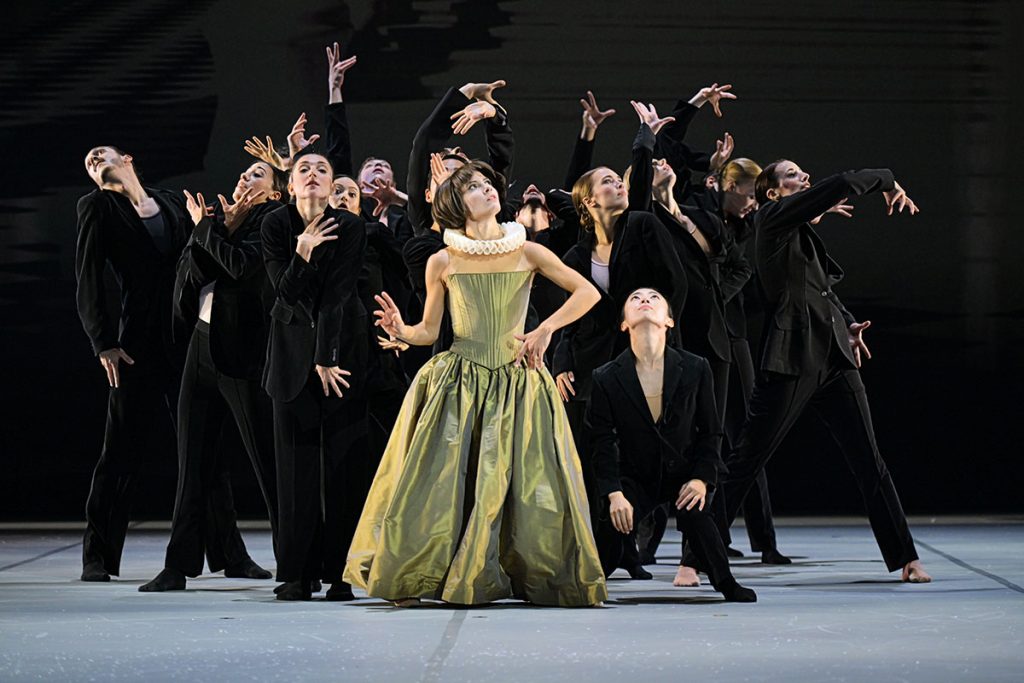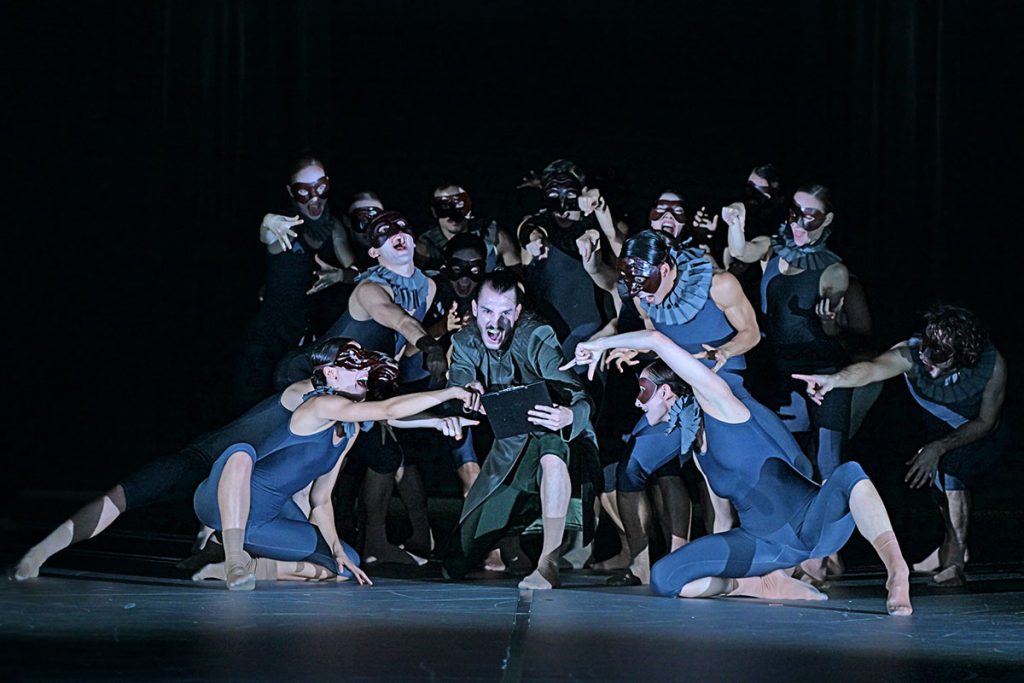ORLANDO
“[ … ] The Graz Opera Ballet starts the season. The Irish choreographer Marguerite Donlon brings the feminist classic to the stage as a timeless fairy tale. She skilfully plays with the different eras that this epic of movement traverses, both in her movement language and in the costumes (Silke Fischer). Donlon stages “Orlando” with the marvellous Lucie Horná in the title role. [ … ]The choice of music – from Henry Purcell and Edward Elgar to Benjamin Britten and Philip Glass – also supports this aura of timelessness, which is conjured up in the opera by the Graz Philharmonic Orchestra under Marius Burkert. [ … ] Lucie Horná shines in the title role. The omnipresent dancer carries the evening seemingly effortlessly. She lends her Orlando mischievous charm, feminist combativeness and androgynous grace, without ever falling into a form of mannerism – despite all the play with gender attributions.
[ … ] And when Donlon gets the entire ensemble to dance (for example to “Pomp and Circumstance”), this “Orlando” is in absolute top form anyway.
(Christoph Hartner for the Kronen Zeitung)


PRESS: English
“[ … ] That the theme of the narrative ballet had to be a contemporary one was a matter of course for the experienced dance manager Elwert. What was not self-evident, however, was how Virginia Woolf’s trend-setting novel could be brought to the dance stage with contemporary relevance without a libretto and without a given composition. Together with the Irish-born, internationally successful choreographer Marguerite Donlon, who had long wanted to choreograph this work, a way was finally found: A strikingly idiosyncratic and creative one, and not least one that focuses on the equally large and profound theme of self-discovery with well-considered humour. In a splendid, full-bodied work of art. [ … ] What Donlon choreographically and Elwert dramaturgically put on stage with the newly assembled Graz ballet company (18 dancers, six of whom are newcomers) in the numerous scenes of the two-act realisation of the novel is convincingly rooted in content, thought-provoking and dynamically creative in dance. The dance language changes in a comprehensible and illuminating way: interspersed ballet poses and briefly quoted, classical pas de deux movement sequences in flow are replaced and expanded by the emotional and individual expressiveness of contemporary dance, carried by surprising, even formless, searching contradictions. [ … ] Lucie Horná fully fulfils the high demands placed on her as the multi-faceted Orlando. [ … ] Her acting skills here are remarkable in the strength of the subtlety conveyed; this applies to her solos as well as to duets with very different partners: with Henrietta (delicious: Christoph Schaller) and congenially with Shelmerdine (Leonardo Germani). [ … ]” (Eveline Koberg for tanz.at)
“The Irish choreographer Marguerite Donlon tells Orland’s story with a lot of humour and some surprises. The Graz Opera Ballet ensemble performs with great energy and impresses with good technique. [ … ] It is admirable how Lucie Horná has internalised the role and seems to change herself in the course of the piece. She has an irrepressible energy and desire to play right to the end – definitely an outstanding performance, as she is on stage most of the time. She rightly received a lot of cheers for this at the end. [ … ] After a good two hours, a visibly relieved ensemble and the successful debut of the new ballet director deserved a lot of cheers. It’s nice that stories are still being told on stage today.” (Paul Delavos for tanznetz.de)
PRESS: Deutsche:
“ [ … ] Das Ballett der Oper Graz startet in die Saison. Marguerite Donlon inszeniert „Orlando“ mit der großartigen Lucie Horná in der Titelrolle. [ … ] Die irische Choreografin Marguerite Donlon bringt den feministischen Klassiker als zeitloses Märchen auf die Bühne. Geschickt spielt sie sowohl in ihrer Bewegungssprache als auch in den Kostümen (Silke Fischer) mit den unterschiedlichen Epochen, die dieses Bewegungsepos durchschreitet. Auch die Musikauswahl – von Henry Purcell und Edward Elgar bis Benjamin Britten und Philip Glass – unterstützt diese Aura der Zeitlosigkeit, die von den Grazer Philharmonikern unter Marius Burkert souverän in die Oper gezaubert wird. [ … ] In der Titelrolle brilliert Lucie Horná. Scheinbar mühelos trägt die omnipräsente Tänzerin den Abend. Ihrem Orlando verleiht sie spitzbübischen Charme, feministische Kampfbereitschaft und androgyne Grazie, ohne dabei – bei allem Spiel mit Geschlechterzuschreibungen – jemals in eine Form der Manieriertheit zu verfallen.
[ … ] Und wenn Donlon (etwa zu „Pomp and Circumstance“) das gesamte Ensemble antanzen lässt, dann läuft dieser „Orlando“ ohnehin zur absoluten Höchstform auf.
(Christoph Hartner für die Kronen Zeitung)
„[ … ] Dass das Thema des Handlungsballetts ein heutiges sein müsse, war dem erfahrenen Tanzmanager Elwert selbstverständlich. Nicht selbstverständlich hingegen war, wie man ohne Libretto und ohne gegebener Komposition Virginia Woolfs richtungsweisenden Roman zeitgemäß relevant auf die Tanzbühne bringen könnte. Gemeinsam mit der aus Irland stammenden, international erfolgreichen Choreografin Marguerite Donlon, die schon lange dieses Werk choreografieren wollte, wurde schließlich ein Weg gefunden: Ein markant eigenwillig kreativer und nicht zuletzt einer, der mit wohlüberlegt eingestreutem Humor das ebenso große wie tiefgründige Thema der Selbstfindung motivisch fokussierend umkreist. In einem prächtigen, einem prallen Gesamtkunstwerk. [ … ] Das, was Donlon choreografisch und Elwert dramaturgisch mit der neu zusammengestellten Grazer Ballettcompagnie (18 TänzerInnen, sechs von ihnen neu dazugekommen) in den zahlreichen Szenen der zweiaktigen Romanumsetzung auf die Bühne stellen, ist inhaltlich überzeugend verwurzelt wie denkanstoßend und tänzerisch dynamisch kreativ umspielt. Die Tanzsprache changiert nachvollziehbar und erhellend: Eingestreute Ballettposen und kurz zitierte, klassische Pas de Deux-Bewegungsfolgen im Fluss werden abgelöst und erweitert durch die emotionale und individuelle Aussagekraft zeitgenössischen Tanzes, getragen von überraschender, ja formloser, suchender Widersprüchlichkeit. [ … ] Lucie Horná entspricht als facettenreicher Orlando den an sie gestellten hohen Anforderungen voll und ganz. [ … ] Ihre hier zum Tragen kommenden darstellerischen Fähigkeiten sind bemerkenswert in der Stärke der vermittelten Feinsinnigkeit; was für ihre Soli wie auch für Duette mit sehr unterschiedlichen PartnerInnen gilt: mit Henrietta (köstlich :Christoph Schaller) und kongenial mit Shelmerdine (Leonardo Germani). [ … ]“ (Eveline Koberg für tanz.at)
„Die irische Choreografin Marguerite Donlon erzählt Orlands Geschichte mit viel Witz und manchen Überraschungen. Das Ballettensemble der Oper Graz agiert mit großer Energie und beeindruckt mit guter Technik. [ … ] Bewundernswert wie Lucie Horná die Rolle verinnerlicht hat und sich im Stückverlauf scheinbar selbst verändert. Bis zuletzt hat sie eine unbändige Energie und Spiellust – definitiv eine herausragende Leistung, da sie die meiste Zeit auf der Bühne ist. Zu recht bekam sie am Ende viel Jubel dafür. [ … ] Nach gut zwei Stunden verdient viel Jubel für ein sichtlich erleichtertes Ensemble und den gelungenen Einstand des neuen Ballettchefs. Schön, dass auch heute noch Geschichten auf der Bühne erzählt werden.“ (Paul Delavos für tanznetz.de)
Musikalische Leitung: Marius BurkertChoreographie & Inszenierung: Marguerite DonlonBühne: Marguerite DonlonKostüme: Silke FischerVideo: Lieve VanderschaeveSound | Komposition: Paul CalderoneLicht: Ernst SchießlDramaturgie: Dirk ElwertOrlando: Barbora Kubátová / Lucie HornáQueen Elisabeth I: Mireia González-Fernández / Savanna HaberlandSascha, russische Prinzessin: Mireia González-Fernández / Rosa Maria Pace / Stephanie CarpioEuphorysme, irische Prinzessin: Kirsty Clarke / Savanna HaberlandHarry-Henrietta: Christoph Schaller / Philipp ImbachMarmaduke Bonthrop Shelmerdine, Orlandos Ehemann: Fabio Agnello / Leonardo Germani / Thibaut Lucas NuryOrlandos Eltern: Giulio Panzi / Rosa Maria PaceMr. Green, Kritiker: Fabio Agnello / Thibaut Lucas NuryMr. Pope, ein Poet: Lorenzo Galdeman / Philipp ImbachWaschfrau: Brandon Carpio3 Tugenden: Isabel Edwards / Stephanie Carpio / Yuka EdaDrei Orlando- “Doubles”/Finale: Barbora Kubátová / Brandon Carpio / Diego del Rey / Lucie HornáStimme (Zuspielung): Lily Katharine Virginia Sykes
